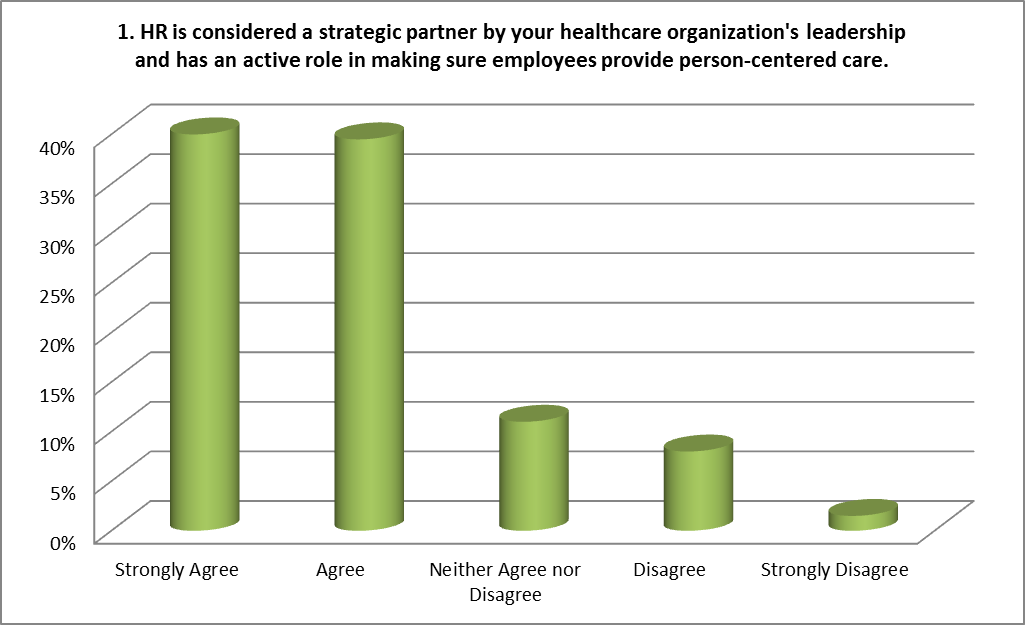Does HR play a critical role in creating and maintaining a person centered care environment?
HealthcareSource provides software solutions that senior communities use to hire and develop the very best employees to care for their residents. A few months ago, they conducted the HR Influence Survey in conjunction with Planetree to learn what kind of role HR plays in providing person-centered care and a positive resident experience. Over the next few months, I will share some of the results of that survey and, talk about what the results mean.
Demographics
Let’s start with the underlying demographics of the survey respondents:
- Around 200 long term care/senior housing professionals responded.
- The mix was:
- 49% HR people
- 35% Business/Administration
- 9% Clinical
- 7% Education
- 53% of the respondents were individual contributors
- 47% were a director, manager or corporate level staff


The Role of Human Resources
The first question asked if the organization’s management saw HR as a strategic partner that plays an active role in making sure employees provide person-centered care. 80% of the long term care respondents either agreed or strongly agreed that that HR made a big difference, 11% were neutral and 10% felt HR played no significant role in making sure person-centered care was a priority in their community.
What It Means
These results made me scratch my head. The perceived high value of HR as a strategic internal partner does not come close to fitting my perception how what it is like in the real world. My thoughts on what this means (and I hope you will share yours):
- “Person-centered care” has a very loose definition (I know people who are focused on person-centered care would disagree) and so in some sense every senior community that gives a resident any kind of choice may very well describe themselves as valuing person-centered care. Further, not many people are going to say “We are not providing person-centered care” or “My organization does not believe in person-centered care” It would be like saying “we don’t care about our residents”, and not even the worst senior community says that.
- While I see many really nice senior communities that treat residents with dignity and respect, that provide good food and entertainment, person-centered care is so much more than this. It is really a way of looking at residents; it is more about empowering residents than it is about pampering residents a somewhat subtle but very important difference.
Perhaps the biggest single take-away for me is that there is much work to be done in evangelizing the whole concept of person-centered care. It is so much more than just a marketing term or a few programs or ideas that expand resident choice. It is a way of looking at residents and employees from a new perspective. The thing that makes person-centered care is that it requires giving up control to residents and line staff. We are asking executives, department heads and managers who got to where they are by exercising huge amounts of control to let go, something is fundamentally foreign to their DNA. A true person centered senior community will . . .
- Make going to work more fun for managers and front-line staff
- Make residents happier
- Reduce stress for everyone
- Mean that residents will live longer and healthier lives
- Reduce costs and increase margins
It is why the educational efforts of organizations like HealthcareSource are so important. They provide the vision for a better way of doing things and the technology needed to implement this new way. Are you interested in learning more about the HealthcareSource & Planetree HR Influence Survey? Watch the HR Influence Webinar to learn more results from the survey, along with best practices for how HR can positively impact person-centered care and the resident experience.
How is HR seen in your organization?
Steve Moran









